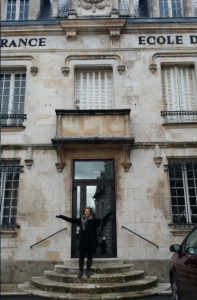I wonder if, when the house is finished, we forget the foundational infrastructure required for function. How does water get into and out of my house? Who ran the wires so that our lamps illuminate our space? Who did the work, and what work was done, prior to the slab being poured?
When we recall a basic multiplication fact, it’s like flipping a light switch in our house. The electrical wiring allowing us to turn on the light is linked to sound, safe, and deeply connected infrastructure. (K. Nims, August 30, 2015)
Just like the light switch is not part of the foundation, memorization of multiplication facts is also not foundational. It is efficient and functional. Efficiency must not trump understanding.
We need people who are confident with mathematics, who can develop mathematical models and predictions, and who can justify, reason, communicate, and problem solve. (Boaler, n. pag.)

Students who rely solely on the memorization of math facts often confuse similar facts. (O’Connell, 4 pag.)
Students must first understand the facts that they are being asked to memorize. (O’Connell, 3 pag.)
What if we have forgotten all the hard work that came prior to the task of memorizing our multiplication facts?
Do we remember learning about multiplication as repeated addition? Have we forgotten the connection between multiplication, arrays, and area?
Conceptual understanding of multiplication lays a foundation for deeper understanding of many mathematical topics. Memorizing facts denies learners the opportunity to connect ideas, exercise flexibility, and interact with multiple strategies.
The goal is to have confident, competent, critical thinkers. Let’s remember that a strong foundation has many unseen components. What if we slow down to develop deep understanding of the numeracy of multiplication?
Second, going slow helps the practitioner to develop something even more important: a working perception of the skill’s internal blueprint – the shape and rhythm of the interlocking skill circuits.” (Coyle, 85 pag.)
Is it possible to look at two seedlings and tell which will grow taller? The only answer is It’s early and they’re both growing. (Coyle, 166 pag.)
How might we serve our learners by slowing down to give them time to learn to show what they know more than one way?
Learner, Thinker, Writer: Jill Gough (@jgough) serves the Trinity School community as Director of Teaching and Learning.
Boaler, Jo. “The Stereotypes That Distort How Americans Teach and Learn Math.” The Atlantic. Atlantic Media Company, 12 Nov. 2013. Web. 30 Aug. 2015.
Coyle, Daniel (2009-04-16). The Talent Code: Greatness Isn’t Born. It’s Grown. Here’s How. Random House, Inc.. Kindle Edition.
O’Connell, Susan, and John SanGiovanni. Mastering the Basic Math Facts in Multiplication and Division: Strategies, Activities & Interventions to Move Students beyond Memorization. Portsmouth, NH: Heinemann, 2011. Print.





